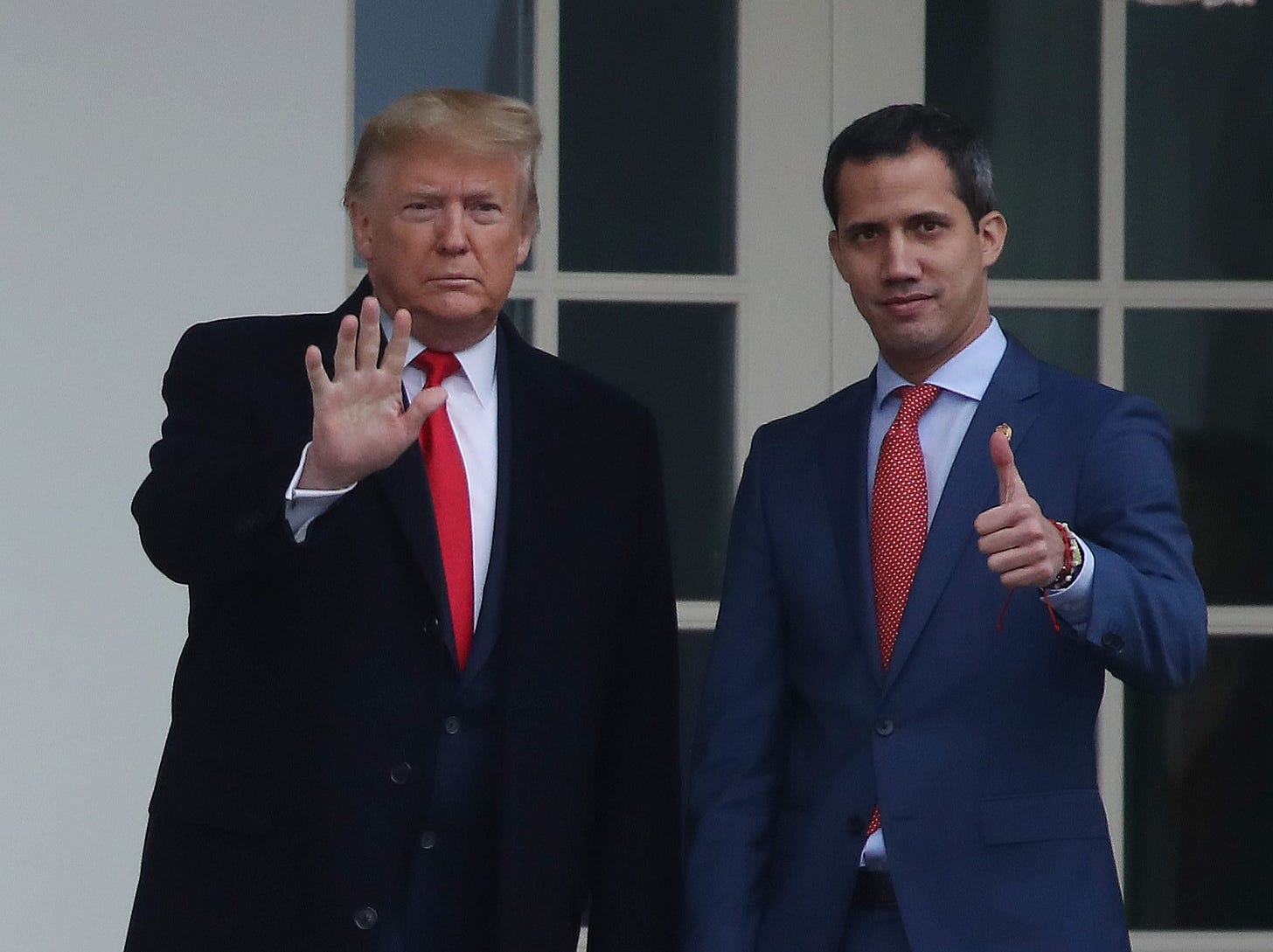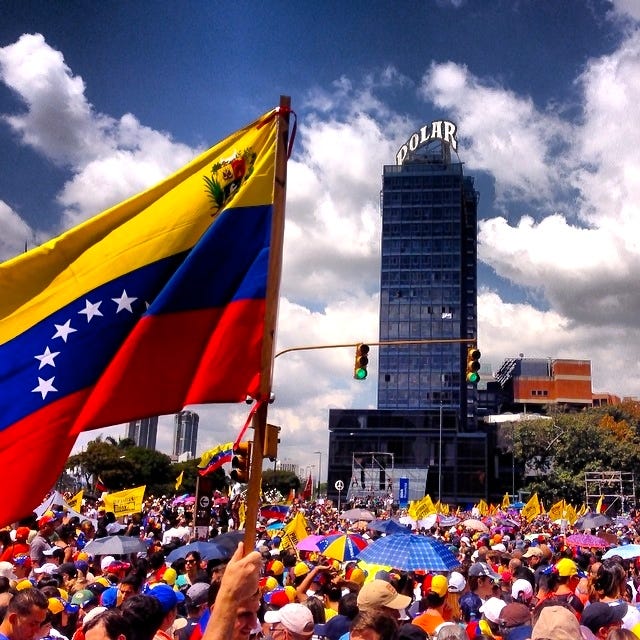"What the Hell Happened to Venezuela?" Part III: Protests & Political Instability
Examining the government crackdown, disputed 2018 elections, and Juan Guaidó.
Welcome to JoeWrote! If you enjoy my work, please consider supporting it with a premium subscription.
Enjoy! Joe
This is the finale of a 3-part series examining the economic and political collapse of Venezuela. Part I examined Venezuela’s nationalized oil industry and the 2014 - 2016 global oil price crash that started the country’s decline.
Part II looked at how the United States perpetuated the collapse through sanctions, worsening the situation.
To conclude the series, this article will examine the government crackdown against dissent, the disputed 2018 election, and how the United States further worsened the situation by involving itself in the Venezuelan political turmoil.
Amidst the economic spiral caused by the collapse of global oil collapse, Venezuela descended into widespread social unrest. Recall that the majority of Venezuela’s state income (96%), and therefore the Chavez-era social welfare programs, depended on oil exports. When oil was no longer a viable income stream, the economy went belly up and the people began to protest.
Like many mass movements, the anti-government protests in Venezuela began with an unrelated spark, then quickly evolved into a larger critique of the country’s leaders. For example, the 2014 protests began with college students demanding better protection against crime following the attempted rape of a classmate, then expanded into widespread criticism of the government, most notably on the issues of inflation and food shortages.
In 2017, an unpopular Supreme Court ruling provoked another round of protests, to which the Venezuelan authorities responded brutally. According to Amnesty International, there was “a policy of repression implemented by the government of Nicolás Maduro, including reports of extrajudicial executions, excessive use of force, arbitrary detentions and torture, and other ill-treatment against those perceived as critical of the government.”
In the midst of this collapsing economy, state repression, and the financial strangulation of American sanctions, came the infamous 2018 Presidential elections.
The 2018 Elections
Venezuela held Presidential elections on May 20th, 2018. According to the Venezuelan National Electoral Council (CNE), a five-member election oversight council established by the Venezuelan Constitution, Maduro won re-election with 68% of the vote (5.8 million). Immediately, accusations of voter suppression and election illegitimacy were raised. In fact, many concerns were raised prior to the election by the Democratic Unity Roundtable (MUD), the coalition of politicians and parties in opposition to Maduro’s government.
In the months leading up to the election, there had been ongoing negotiations between MUD and the PSUV (Maduro’s party) to reconstitute the CNE and invite foreign observers to oversee the election. MUD also protested against the exclusion of two prominent anti-Maduro politicians, who were barred from contending as they were facing criminal charges. When the PSUV declined the demands, MUD deemed the election illegitimate and called for a boycott.
With a sizable non-Maduro constituency abstaining, the only other candidates opposing Maduro were the former Socialist-turned-MUD-affiliate politician Henri Falcón who received 1.8 million votes, and the obscure evangelical minister Javier Bertucci who received approximately 925,000 votes.
This remarkably low turnout is often cited as evidence of the election’s illegitimacy. Only 46% of Venezuelans participated, compared to 80% in the previous election. While opponents of Maduro point to this as evidence of voter intimidation (a plausible critique, given the history of violence against dissenters) low turnout alone doesn’t necessarily mean illegitimacy. After all, the chief opposition party told its supporters to abstain, meaning most anti-Maduro voters stayed home, essentially handing the election to Maduro.
To recap, what we have here is known as a “total shitshow.” Maduro, who is known to violate human rights and repress opponents, did technically win the 2018 election. The MUD boycott resulted in Maduro getting more votes, as certified by the country’s oversight committee. (To note, I have yet to see any accusations of vote changing.) Yet at the same time, MUD claims the election was illegitimate before it even began.
In the eight months between the election and the inauguration, this shitshow became a total clusterfuck.
Enter, Juan Guiadó
On January 10th, 2019, Nicolás Maduro was sworn in for another 6-year term as the President of Venezuela. Immediately, the National Assembly (Venezuela’s legislative branch), claimed his new term was illegitimate and appointed the head of the National Assembly, Juan Guaidó, as interim President.
According to the National Assembly (NA), which had been controlled by MUD since 2015, the 2018 election was illegitimate. Citing Article 233 of the Venezuelan Constitution (below), the NA argued that the 2018 illegitimacy meant there was no President, and therefore the President of the NA (Guaidó) should become acting President of the country, with an election to be scheduled with 30 days.
When an elected President becomes permanently unavailable to serve prior to his inauguration, a new election by universal suffrage and direct ballot shall be held within 30 consecutive days. Pending election and inauguration of the new President, the President of the National Assembly shall take charge of the Presidency of the Republic.
Already we can see the sources of dispute. According to this article, the President of the National Assembly should become acting President “when an elected President becomes permanently unavailable.” But the NA’s claim wasn’t that Maduro was “an elected President who was permanently unavailable” but that he wasn’t elected at all. To an American ear, this sounds a lot like trying to invoke the 25th Amendment (which empowers a Presidential cabinet to overrule Presidents they deem unfit for office) based on charges of election illegitimacy.
Any American who has been unfortunate enough to pay attention to recent Supreme Court decisions can tell you how subjective statutes like Article 233 are. The American Constitution is a Rorsarch test: judges see what their political beliefs lead them to see, and Venezuela is no different.
Maduro supporters will read Article 233 and state that the opposition-controlled National Assembly is misrepresenting the law to remove a political opponent, while MUD supporters will claim that it is the “essence” of the law they are enacting, as one Maduro opponent wrote below.
To complicate things further, Juan Guaidó received support from the United States and the United Kingdom, both nations that have a long history of replacing organizing coups to install rulers more favorable to Western oil companies. Guaidó was even brought to the State of the Union as President’s Trump esteemed guest, where he received a bipartisan standing ovation.
Conclusion
For Americans, asking “who was the legitimate President of Venezuela as of January 11th, 2019?” is the wrong question. I find the allegations that Maduro put his finger on the scale prior to the election credible, and the human rights abuses employed by his police forces inexcusable and a violation of everything Socialism stands for.
On the other hand, I also don’t see the opposition to Maduro, both in the Venezuelan MUD and The Blob (American Foreign Policy establishment) as good-faith champions of the Venezuelan people. The American President was openly discussing invading the country, a move no one can seriously contend was in the interest of preserving Venezuelans’ human rights.
And it is difficult to argue the 2018 election was entirely illegitimate, given the opposition’s response. Maduro’s victory was certified by the CNE, which was established by the Venezuelan Constitution. Following the election, MUD attempted to use a vague reading of the same Constitution as the rationale for why they should get to choose the President, which feels like they’re picking and choosing which pieces of the Constitution can be used for their benefit. Additionally, the MUD politician Henri Falcón ran against Maduro, claiming the Venezuelan people should get the opportunity to remove the President via the ballot box.
As I said, it’s a total clusterfuck.
From my perspective, I see two political parties fighting for power, neither of which is concerned about the democratic rights of the Venezuelan people. As we saw, Maduro’s government brutally cracked down on dissent, and Guaidó was playing footsies with Trump while he was openly discussing invading Venezuela.
Here lies the essence of the U.S.’s mistake, which extends far beyond Venezuela. The situation in Venezuela was disastrous, complex, and deadly. Whashington’s involvement only made it worse.
As we covered in Part II, U.S. sanctions severely hurt the struggling Venezuelan economy, fueling political unrest. Trump then threatened to invade the country, imposed more sanctions, and backed the unelected Guaidó as acting President for years, even though the justification of his acting status called for a national election within 30 days. And as we now know, America’s concerns about Venezuela were not genuine. Following Russia’s invasion of Ukraine, the Biden Administration quietly reached out to the Maduro government in hopes of restarting the oil trade.
Regardless of what one thinks about Maduro (I don’t like him), it is preposterous to believe the United States backed his ouster based on concern for the Venezuelan people. Criticizing the United States for acting maliciously, or pointing to the many falsehoods in MUD’s justification for raising Guadió does not mean we absolve Nicolás Maduro of his crimes.
Instead, Americans should realize that our presence routinely worsens the situation. We’ve seen it in Venezuela, Libya, Iraq, and numerous other cases in which the United States decided to involve itself in convoluted and dangerous international situations.
I’m doubtful, but hopefully, next time the U.S. will keep its hands off [insert trouble country here].









As the series concludes, I'd love to hear your thoughts on the Venezuelan crisis. More specifically, how do you feel about the US's involvement?